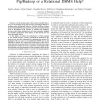Free Online Productivity Tools
i2Speak
i2Symbol
i2OCR
iTex2Img
iWeb2Print
iWeb2Shot
i2Type
iPdf2Split
iPdf2Merge
i2Bopomofo
i2Arabic
i2Style
i2Image
i2PDF
iLatex2Rtf
Sci2ools
CLUSTER
2009
IEEE
2009
IEEE
Analyzing massive astrophysical datasets: Can Pig/Hadoop or a relational DBMS help?
Abstract— As the datasets used to fuel modern scientific discovery grow increasingly large, they become increasingly difficult to manage using conventional software. Parallel database management systems (DBMSs) and massive-scale data processing systems such as MapReduce hold promise to address this challenge. However, since these systems have not been expressly designed for scientific applications, their efficacy in this domain has not been thoroughly tested. In this paper, we study the performance of these engines in one specific domain: massive astrophysical simulations. We develop a use case that comprises five representative queries. We implement this use case in one distributed DBMS and in the Pig/Hadoop system. We compare the performance of the tools to each other and to hand-written IDL scripts. We find that certain representative analyses are easy to express in each engine’s highlevel language and both systems provide competitive performance and improved scalability ...
CLUSTER 2009 | Cluster Computing | MapReduce Hold Promise | Massive Astrophysical Simulations | Modern Scientific Discovery |
| Added | 20 May 2010 |
| Updated | 20 May 2010 |
| Type | Conference |
| Year | 2009 |
| Where | CLUSTER |
| Authors | Sarah Loebman, Dylan Nunley, YongChul Kwon, Bill Howe, Magdalena Balazinska, Jeffrey P. Gardner |
Comments (0)

